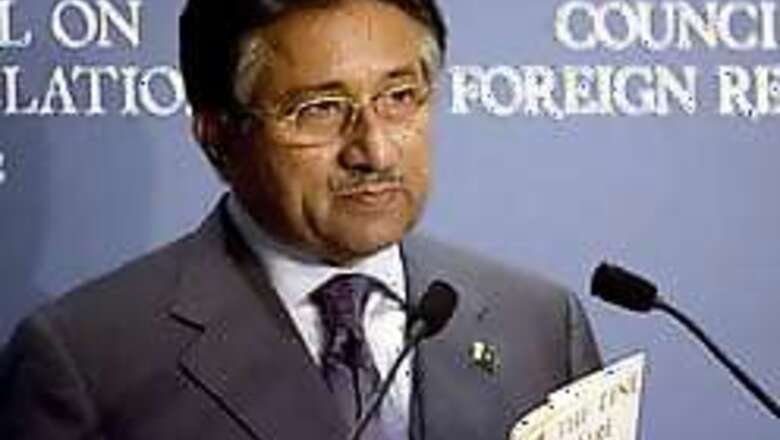
views
Washington: Pakistan President Pervez Musharraf says he prays for more than the proverbial nine lives of a cat, as he has confronted and defied death several times, including two brushes with death in the India-Pakistan war of 1965.
He first avoided death as a teenager in 1961 when he was hanging upside down from the branch of a mango tree and it broke, he writes in the prologue of his memoir, In the Line of Fire, released on Monday in New York.
In 1972, when he was leading a company of commandos as a major in the mountainous Northern Areas, he gave up his seat on a flight from Gilgit to Islamabad to carry the bodies of two of his men. The plane crashed into a glacier up in the Himalayas and has still not been found.
He should have been on President Zia ul-Haq's C-130 airplane that crashed on August 17, 1988 as he had been selected to become his military secretary, but as luck would have it, another brigadier was appointed to the post at the last minute. “That poor man went to a fiery death instead of me,” Musharraf writes.
His closest call was in 1998, when, as a lieutenant general commanding the Mangla Corps, he was called to army headquarters in Rawalpindi for a conference. But as he was playing bridge with a friend at a remote location, he could not ride back with an officer flying to Mangla. The helicopter crashed and he died.
On October 12, 1999, as chief of the army staff when he was returning from Colombo to Karachi, the then prime minister effectively hijacked his plane from the ground, blocking the runway and closing all airports in Pakistan.
"Our fuel was so low that we would have crashed had the army not taken control of Karachi Airport before it was too late. We landed with only seven minutes of fuel to spare," he recalls.
PAGE_BREAK
But it was that "nearly fatal confrontation with the prime minister (that) brought me to power," Musharraf notes.
In 2001, when he took off from New York to Pakistan after the United Nations Summit, the pilot warned him of a bomb threat. The plane returned to New York to find, after hours of search, that the warning was a hoax.
But the events of December 2003 put him in the front line of the war on terror, says Musharraf.
On December 14, 2003, as he was returning to Army House in Rawalpindi after a visit to Karachi, "I heard a loud, though muffled, thud behind us. As my car became airborne I immediately realised what was happening -- I was staring terrorism in the face."
"I thought ruefully that while leaders of other countries only visit scenes of carnage later or see it on a television screen, I was personally in the midst of it," writes Musharraf.
People had barely stopped chattering about this assassination attempt when - on December 25, 2003, a holiday - there was yet another attempt by two suicide car bombers, Musharraf recalls.
It was later discovered that there was supposed to be a third suicide bomber to attack on him frontally, but for some reason he didn't materialize.
"If he had not abandoned the job he would almost certainly have succeeded in killing me, for by then my car was in very bad shape and was "naked", without protection. Such are the ways of the Almighty," writes Musharraf.
"The investigation into my would be assassins led us to some of Al Qaeda's top people in Pakistan," he says describing it as representing "one of our greatest victories in the war on terror".
But the reason he came to be the man the assassins were targeting is that the story of his life coincides almost from the beginning with the story of his country, says Musharraf describing his just released book as "a biography not only of a man, but of Pakistan as well".
















Comments
0 comment